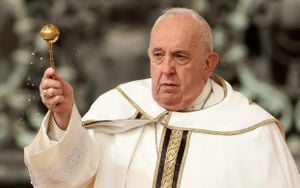On February 16, 2024, Alexey Navalny, the leading voice of opposition against Vladimir Putin, tragically passed away under suspicious circumstances in a high-security penal colony. His untimely death, which echoed the dark realities of political repression within Russia, left many questioning the future of dissenting voices in the country. Just one year later, the Russian opposition remains fragmented and demoralized, struggling to uphold the spirit of change Navalny once embodied.
After Navalny’s death, his supporters gathered at the Borisovsky cemetery to pay tribute. They laid flowers on his grave, and many stood braving the cold to honor his memory, as fears lingered of police crackdowns on such gatherings. Among those mourning were families who lit candles beside pictures of the slain dissident, instilling hope for future change, albeit uncertain. Yulia Navalnaya, Navalny's widow, expressed the importance of remembering those who cannot protest inside Russia: “We must manifest for those who cannot do it,” she stated at the Munich Security Conference earlier this year.
Within the opposition ranks, the sense of loss is palpable. Following Navalny's death, many have wondered who could step up to fill the void he left behind. Friends and colleagues openly acknowledge the challenge; it’s as if no one can match his energy, charisma, or persistence. Despite the passage of time, voices like Vladimir Kara-Murza and Ilya Yashin, who participated in street protests and were briefly detained, have found themselves embroiled in factional disputes.
A significant aspect of the current climate among Russian expatriates is the division on how to conduct their opposition. “It is impossible to change Russia from the outside,” Yashin noted, reflecting on the sentiments of many dissidents who have fled abroad seeking security, yet find themselves wrestling with their own internal conflicts.
This fracturing was made evident during events held abroad. A gathering of anti-Putin dissidents, including factions allied with Navalny's movement, convened recently to discuss their plans. Notably absent was Navalny's collective, which underscored the rift between those seeking immediate political change versus those advocating for slower, strategic advancements. Among accusations of financial improprieties and disloyalty, the sense of unity once at the core of Navalny's movement is faltering.
The current geopolitical turmoil, particularly surrounding the conflict with Ukraine, has exacerbated these fractures. Notable figures like Garry Kasparov stirred the pot by criticizing the opposition's lack of clear support for Ukraine during the war. “You never hear the Russian opposition saying Ukraine must win,” Kasparov was quoted, highlighting the significant disconnect between their actions and the prevailing political sentiment. It reflects the wider struggle of the opposition to form cohesive strategies amid personal disagreements and divergent beliefs.
Adding to these tensions is the emotional weight carried by Navalny’s legacy. He had often asserted, “If you leave the country, it means you have surrendered,” indicating his deeply held belief in fighting for Russia, even under dire personal risks. His philosophy resonates with many; it creates friction for those who chose exile compared to those who remain and fight, even at great personal cost.
Simultaneously, the opposition faces external attacks on their credibility. The Anti-Corruption Foundation, established by Navalny, accused Leonid Nevzlin of having orchestrated attacks against one of Navalny's allies, raising questions about internal loyalty and strategy. The accusations of double-dealing only serve to underline the fragile alliances among dissidents, who find it increasingly hard to distinguish friend from foe.
Meanwhile, political sentiments continue to flare as discussions surrounding memorials for Navalny arise. For example, the city of Milan recently approved the installation of a commemorative plaque for Navalny, with officials highlighting the need for solidarity with the oppressed Ukrainian people as well. The mayor of Milan, Beppe Sala, was unequivocal: “There is only one people being attacked—the Ukrainian,” stating the need to stand firm against oppressive forces both at home and abroad.
Across the border, reactions to Navalny's brutal treatment and premature death reflect larger societal questions. Following reports of Navalny's documented torture and unlawful detainment, public awareness of the Putin regime's dark methods burgeoned. The documentary created by journalist Ezio Mauro, which chronicled Navalny’s life and the investigation after his poisoning, reinforced the brutality faced by those standing against Putin’s regime.
Navalny has become synonymous with resistance to tyranny. His life and tragic end serve as painful reminders of the personal sacrifices made still resonate deeply with those seeking change. Without his guiding presence, the question remains: Will the Russian opposition be able to rally others against authoritarianism?
With the Russian opposition struggling to unite under the shadow of Navalny’s legacy, they face mounting challenges both from within their ranks and from the Kremlin. The future of resistance remains unsure—will it spark renewed energy or remain stunted? For many, the hope lies not only in remembering Navalny’s fight but also igniting collective efforts to continue what he started. His loss may have left a void, but perhaps it has also sown the seeds of renewed determination among those left standing.



